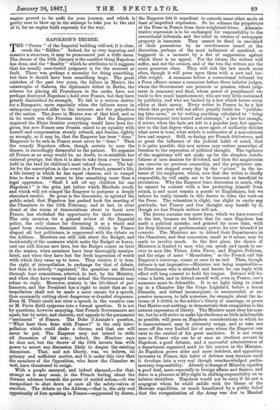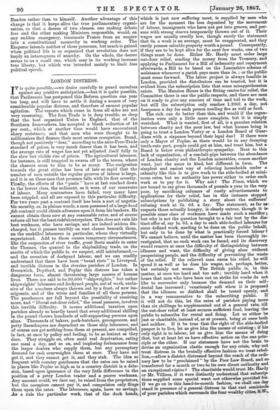NAPOLEON'S DECREE. " Crown " of the Imperial building will
not, it is clear, crush the " Edifice." Indeed, for so very imposing and massive a structure, it may be pronounced just a trifle mean. The decree of the 19th January is the smallest thing Napoleon has done, and the " finality " which he attributes to it suggests that his usually sure-footed judgment is for the moment at fault. There was perhaps a necessity for doing something, but then it should have been something large. The great mistakes of the past two years, the failure in Mexico, the catastrophe of Sadowa, the diplomatic defeat in Berlin, the scheme for placing all Frenchmen in the ranks, have not perhaps destroyed Napoleon's hold over France, but they have greatly diminished its strength. To fail is a serious matter for a Bonaparte, more especially when the failures occur in enterprizes opposed alike to the interests and the prejudices of the nation. The fiasco in Mexico was of that kind, and so in its result was the Prussian intrigue. Had the Emperor acquired the Rhine frontier everything would have been for- given, but now France sees Prussia raised to an equality with herself and compensation sternly refused, and fancies, rightly or wrongly, as it may be, that the Emperor has been " done." Emperors to be safe in France must never be " done." Then the remedy Napoleon offers, though certain to cure the disease, is exceedingly distasteful to the patient. To organize all France as an army would be, no doubt, to re-establish her external prestige, but then it is also to take from every house- hold in the land its children's most valued chance. The bal- lot for the conscription is the event in a French peasant's life, a life lottery in which he has equal chances, and to compel him to draw a blank seems to him something more than a legal oppression. " Shall I sell all my children for one Napoleon ? " is the grim jest before which Marshals recoil, and which will yet compel the Emperor to postpone a deeply cherished resolve. So great is the discontent, so agitated the public mind, that Napoleon has pushed back the meeting of the Chambers to the 10th February, and at last, in utter dread of the storm of denunciations about to burst over France, has abolished the opportunity for their utterance. The only occasion for a general review of the Imperial policy, the only chance for discussing it as a whole and apart from wearisome financial details, which in France disgust all but politicians, is suppressed with the debate on the Address. Members can still talk about the Budget, and incidentally of the measures which make the Budget so heavy, and can still discuss new laws, but the Budget comes on later in the session, when members have been thoroughly manipu- lated, and when they have lost the fresh impression of wrath with which they came up to town. They receive, it is true, the right of interpellation in exchange for that of debate, but then it is strictly "regulated," the questions are filtered through four committees, selected, in fact, by the Ministry, and when they have escaped that ordeal the Government may refuse to reply. Moreover, oratory is the life-blood of par- liaments, and the President has a right to insist that an in- terpellation shall not be made a mere excuse for a speech, thus summarily cutting short dangerous or dreaded eloquence. Even M. Thiers could not utter a speech. in the vocative case or M. Fevre distil epigrams into a formal question. It is not by questions, however annoying, that French Governments are upset, but by satire, and rhetoric, and appeals to the permanent " sentiment ' of France. The Duke d'Aumale's question, "What halt thou done with France I" is the only inter- pellation which could shake a throne, and that one will never be put. The Emperor may not intend to stifle all discussion of his acts ; indeed, the Moniteur says lie does not, but the decree of the 19th invests him with power to arrest any discussion likely to deepen the existing .discontent. That, and not liberty, was, we believe, its primary and sufficient motive, and it is under this view that the members of the Opposition, who know the Chamber so well, have threatened to resign.
With a people annoyed, and indeed alarmed,—for that, strange as it may seem, is the French feeling about the German advance towards the power of united action,—it was inexpedient to shut down at once all the safety-valves of emotion. The debate on the Address,—that is, the only real opportunity of free speaking in France—suppressed by decree, the Emperor felt it expedient to concede some other mode at least of imperfect expression. So he releases the proprietors of the Press in France from their weightiest fetter. Adminis- trative repression is to be exchanged for responsibility to the correctional tribunals, and the 'relief to owners of newspaper property is immense. They cannot be fined in one-third of their possessions by an avertissement issued at the discretion, perhaps of the most indiscreet of mankind, or beggared in a moment by a fiat of suppression against which there is no appeal. For the future, the writers will suffer, and not the owners, and of the two the writers are the more generous class. They will risk the law much more often, though it will press upon them with a new and ter- rible weight. A summons before a correctional tribunal for a Press offence means a summons before three inferior judges, whom the Government can promote or pension, whose judg- ment is summary and final, whose power of punishment ex- tends to five years' imprisonment, who are very little restrained by publicity, and who are backed by a law which leaves every editor at their mercy. Every writer in France is, by a law which this project will not affect, penally liable for "publish- ing false news," or for writing anything calculated to "bring the Government into hatred and contempt," a law fair enough, if severe, when the facts are left to a popular jury, but oppres- sive to the last degree when a mere agent of authority decides what news is true, what article is subversive of a non-existent love and respect. Still, so daring are French litterrateurs, and so great the influence of the judicial habit of mind, that it is quite possible this new system may restore somewhat of freedom to the expression of political thought. The vigilance of the magistracy will not make up for the sleepless watch- fulness of men anxious for dividend, and then the magistrates can exercise no previous censorship, and the proprietors can. Articles are stopped every day by the " ge'rant" in the in- terest of his employers, which, now that the writer is chiefly responsible, he will easily see to be innocent or beneficial to circulation. Why the Emperor fears discussion so much, why he cannot be content with a law protecting himself from attack, is and must remain a puzzle to Englishmen, but we believe he really intends in this decree to relax the curb on the Press. The relaxation is slight, too slight to excite any gratitude, but France and free thought may benefit by it, though we fear French writers will not.
The decree contains one more item, which we have reserved to the last, because we believe that for once Napoleon has made a political mistake, and granted far more than, with his deep distrust of parliamentary power, he ever intended to concede. The Ministers are to defend their Departments in the Chambers, and that concession, small as it seems, may be made to involve much. In the first place, the choice of Ministers is limited to men who can speak, and speak in an- swer to men like Thiers, Jules Fevre, and Eugene Pelletan, and the reign of mere " Mamelukes," as the French call the Emperor's entourage, comes at once to an end. Then, though defence is not imperative—Ministers not being responsible— no Frenchman who is attacked and knows he can reply with effect will long consent to hold his tongue. Defence will be- come a habit, and to defend oneself well, even in France, one's measures must be defensible. It is no light thing to stand up in a Chamber like the Corps Legislatif, before a dozen Disraelis, and defend inconsequent, or unsuccessful, or ex- pensive measures, to talk nonsense, for example, about the in- crease of 1-500th in the soldier's liberty of marriage, or prove that Mexico cost nothing, or demonstrate that compulsion is the natural expression of liberty. The Minister must obey his mas- ter, but he will strive to make his obedience as little indefensible as possible; will press on Napoleon considerations to which he is unaccustomed, may in extremity resign, and so take one more off the very limited list of men whom the Emperor can raise to the control of his great machines. It is not every man in France who can be at once an obedient servant to Napoleon, a good debater, and a successful administrator of a department organized until its life centres in the Minister. As Napoleon grows older and more indolent, and opposition increases in France, this habit of defence may increase until it develops into a very real though unacknowledged parlia- mentary responsibility. Already a change of Ministry signifies a good deal, more especially in foreign affairs and finance, and there is a pleasure at fifty-eight in shifting responsibility on to inferior shoulders. Napoleon would not be sorry if he saw a scapegoat whom he could saddle with the blame of the Mexican expedition, or much humiliated by a public belief that the reorganization of the Army was due to Marshal Bandon rather than to himself. Another advantage of this change is that it keeps alive the true parliamentary organi- zation, so that a decree of two clauses, one making debate free and the other making Ministers responsible, would, on any sudden emergency, transmute France from an empire into a constitutional monarchy in working order. The Emperor intends neither of these processes, but much is gained when political life is so organized that revolution does not imply an interregnum of anarchy. On the whole, the decree seems to us a small one, which may in its working increase true liberty, but which was intended mainly to limit free political speech.































 Previous page
Previous page